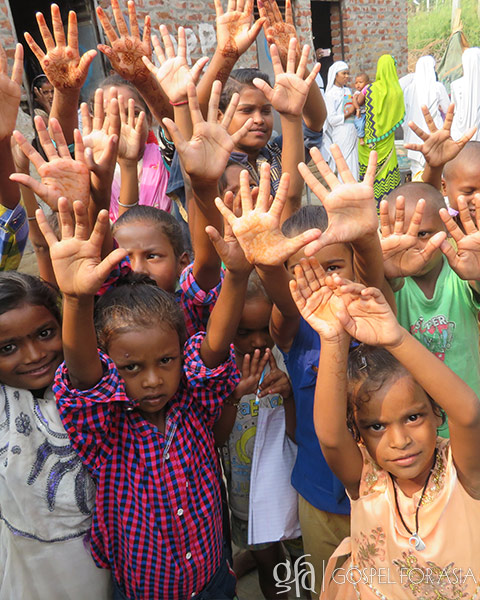
What do a group of prisoners, slum dwellers and street and school children in various regions of South Asia have in common? The answer is simple, yet deadly: the lack of proper handwashing practices. People living in congested jails[1] or on the streets[2] generally lack adequate hygiene practices. Couple this with a severe lack of hygiene facilities, and the risk of disease skyrockets—a problem violently brought to light by the COVID-19 pandemic.
But GFA World is addressing this problem.
Teaching Those Behind Bars
Every year, on Oct. 15 Global Handwashing Day, GFA workers organize awareness programs to teach people how to stave off sicknesses through the simple act of washing their hands.
Last year, one group of workers visited a prison where living conditions could easily breed illness. Around 177 inmates attended the program and listened to the Gospel for Asia (GFA) workers explain how washing hands can reduce the risk of infections and even death; then they watched a demonstration on how to properly wash their hands. Afterwards, the workers distributed hygiene packages containing toothbrushes, oil and soap.
“I give thanks to [the church] who shared about hand-washing to us and how I should save my life from the diseases, which can be spread through dirty hands,” said one prisoner.
Educating Children
In another region, children living in crowded slums sat in verandas to learn about the importance of handwashing. They watched an interactive animated film about a young girl who gets sick because of her dirty hands, and then they learned helpful songs that will remind them when to wash their hands.
“I often get stomach pain and fevers,” said Meheryar, a young resident of the slums. “Now, I know the reason behind it. I will keep my hands always clean and will be healthy again.”
At a home for street children, a group of Sisters of Compassion and other Gospel for Asia (GFA) workers brought the same message that the church was promoting across Asia: handwashing can save your life. Workers learned that street children in the area had a high mortality rate, with most dying by the time they reached 25–35 because of unhygienic living and “the rugged nature of their survival.” They handed out soap and towels to each of the children.
“I was living like a savage animal and did not care about my body,” said 18-year-old Hitanshu. “No one taught me anything about a healthy lifestyle, but today I have learned a lot.”
A Constant Reminder to Wash Their Hands
Around 264 million children are without basic handwashing facilities in Central and Southern Asia, according to the World Health Organization. They also report that, globally, two out of every five schools have no hygiene facilities.[3] That’s why, in addition to the good habits of health and hygiene they teach, Gospel for Asia (GFA) workers across Asia, including GFA Bridge of Hope staff, observe Global Handwashing Day every year.
“Each year we do programs,” said Panchi, a Bridge of Hope staff member. “But it is important that we keep on reminding them so that they will practice the good habits.”
With the current pandemic, the importance of Global Handwashing Day cannot be overstated. Gospel for Asia (GFA) workers make it their goal to inform as many as possible of the life-saving benefits of handwashing. The CDC states that handwashing alone can reduce the number of people sick with diarrhea by 23 to 40 percent, diarrheal illnesses in people with weak immune systems by 58 percent and respiratory illnesses in the general population by 16 to 21 percent.[4]
Handwashing saves lives by preventing disease. And that’s what Gospel for Asia (GFA) workers are aiming for: healthy and happy communities free from illness.
Read more about how GFA workers help protect those vulnerable to disease.
